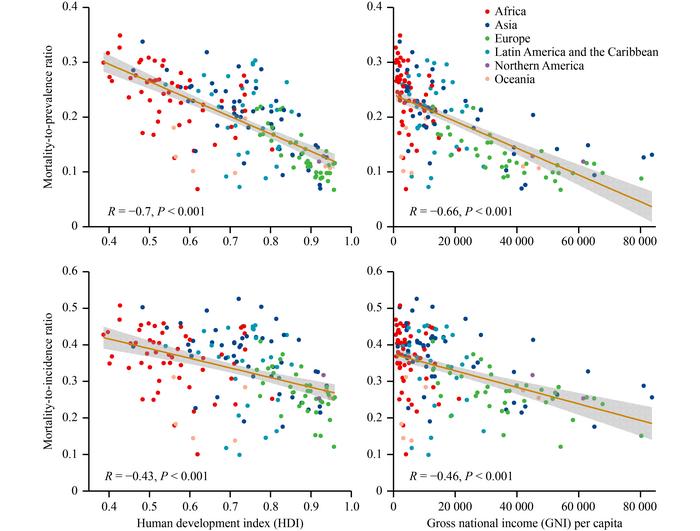
Cancer continues to be one of the leading global health concerns, exacerbated by rising incidences and disparities across different regions. The GLOBOCAN 2020 report has painted a grim picture, revealing that there were approximately 19.3 million new cancer cases and 10 million cancer-related deaths worldwide. This staggering data underscores the urgent need for comprehensive strategies aimed at prevention, early detection, and treatment of cancer. As populations grow and age while embracing riskier lifestyles, the cancer burden is expected to rise significantly, particularly in low to medium Human Development Index (HDI) countries.
The predictive analysis of cancer trends indicates that countries with low HDI will bear the brunt of this surge by 2040. Conversely, high HDI nations, while also experiencing increased incidences, display a concerning difference in cancer mortality rates. These discrepancies highlight an urgent call for targeted interventions that would bridge the existing gaps in health equity across different geographic and socioeconomic landscapes. Addressing such disparities is crucial for implementing effective health policies that improve cancer outcomes globally.
In evaluating the statistical data, it became evident that breast cancer has emerged as the most commonly diagnosed cancer across the globe. Meanwhile, lung cancer takes the lead as the most significant contributor to cancer mortality. This juxtaposition of incidence and mortality reveals stark contrasts in healthcare access, awareness, and outcomes that vary significantly between high-income and low-income countries. Notably, regions with high HDI reported the highest cancer incidence rates but also boasted the lowest mortality-to-prevalence (MPR) and mortality-to-incidence (MIR) ratios.
The healthcare quality reflected in MPR and MIR ratios draws attention to the systemic issues faced by those in low HDI regions. For instance, high MPR and MIR ratios are prevalent in low HDI countries in Africa, signaling poorer prognoses and limited access to quality healthcare services. The correlation between socioeconomic factors—such as HDI and Gross National Income (GNI)—and cancer outcomes is significant. Higher HDI and GNI relate to increased cancer incidence and mortality, contrasting sharply with low HDI areas where healthcare infrastructure is often lacking.
Moreover, the demographic analysis indicates that elderly populations and male individuals present higher MPR and MIR ratios. This suggests a pressing need to prioritize cancer awareness and intervention strategies within these demographic groups. As evidence mounts linking socioeconomic development to improved health outcomes, it becomes paramount that global health entities address these disparities decisively and comprehensively.
Effective cancer control requires an integrated approach focusing on early diagnosis and accessible treatment options, particularly in low and middle HDI countries. Enhanced screening programs and public health initiatives are critical to ensure that cancers are detected at more treatable stages. Furthermore, universal health coverage must be prioritized to ensure equitable access to essential medicines. Without such measures, the ambitious goals set out in global health initiatives will falter.
The global community must also commit to policy measures aimed at limiting exposure to environmental carcinogens. Such steps are vital in regions where industrialization and urbanization have led to increased pollution and lifestyle changes that elevate cancer risks. Awareness campaigns, bolstered by health education programs, play a crucial role in altering public attitudes towards preventive care and healthy living.
Recent studies underscore the need for immediate action from both governments and healthcare providers to confront the looming cancer crisis. Coordinated efforts are required to establish frameworks that can effectively reduce cancer rates and improve treatment outcomes for diverse populations. The findings presented illustrate the complexity of the global cancer burden, demanding innovative and tailored solutions that resonate with local contexts.
In conclusion, the analysis of global cancer statistics is a clarion call for action. Disparities in cancer care and outcomes between HDI regions cannot be ignored if the international community is serious about combating cancer as a major public health threat. This scenario implores steps beyond traditional research paradigms, integrating socioeconomic strategies into health policy to foster a more equitable global health environment.
With the knowledge gained from this extensive analysis, stakeholders at all levels are urged to engage in collaborative efforts that transcend boundaries. By combining research, policy-making, and community engagement, we can tackle the challenges posed by cancer effectively. The battle against cancer must be fought not only with data and statistics but through compassion, empathy, and a sustained commitment to health equity.
As we face the reality of the cancer epidemic, it is evident that a multifaceted approach is not merely advantageous but essential.
Subject of Research: Not applicable
Article Title: Disparities in 36 cancers across 185 countries: secondary analysis of global cancer statistics
News Publication Date: 22-Aug-2024
Web References:
References:
Image Credits: Qianru Li, Changfa Xia, He Li, Xinxin Yan, Fan Yang, Mengdi Cao, Shaoli Zhang, Yi Teng, Siyi He, Maomao Cao, Wanqing Chen
Keywords: Health and medicine





